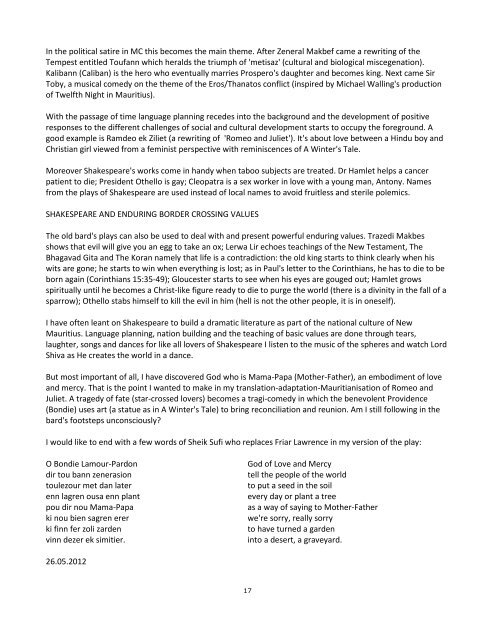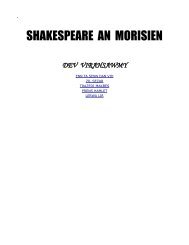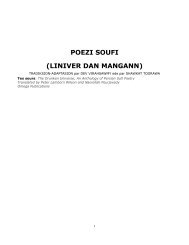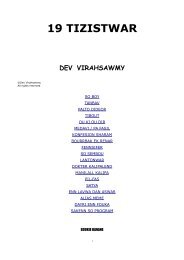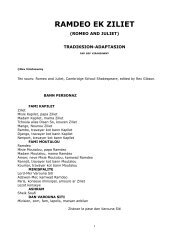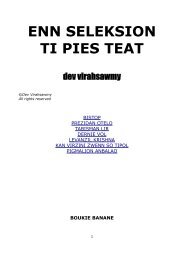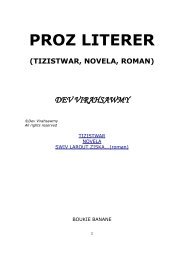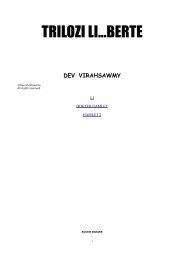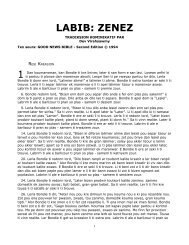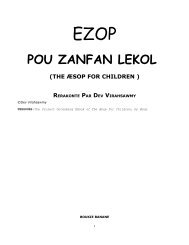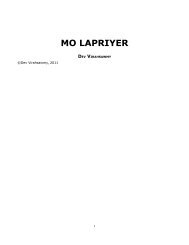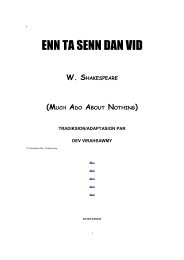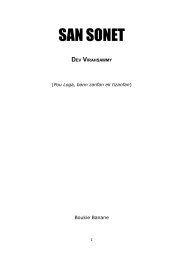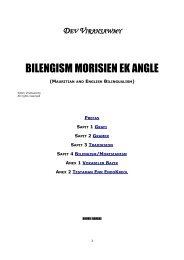LITERESI BILENG AVANSE - boukie banane
LITERESI BILENG AVANSE - boukie banane
LITERESI BILENG AVANSE - boukie banane
You also want an ePaper? Increase the reach of your titles
YUMPU automatically turns print PDFs into web optimized ePapers that Google loves.
In the political satire in MC this becomes the main theme. After Zeneral Makbef came a rewriting of the<br />
Tempest entitled Toufann which heralds the triumph of 'metisaz' (cultural and biological miscegenation).<br />
Kalibann (Caliban) is the hero who eventually marries Prospero's daughter and becomes king. Next came Sir<br />
Toby, a musical comedy on the theme of the Eros/Thanatos conflict (inspired by Michael Walling's production<br />
of Twelfth Night in Mauritius).<br />
With the passage of time language planning recedes into the background and the development of positive<br />
responses to the different challenges of social and cultural development starts to occupy the foreground. A<br />
good example is Ramdeo ek Ziliet (a rewriting of 'Romeo and Juliet'). It's about love between a Hindu boy and<br />
Christian girl viewed from a feminist perspective with reminiscences of A Winter's Tale.<br />
Moreover Shakespeare's works come in handy when taboo subjects are treated. Dr Hamlet helps a cancer<br />
patient to die; President Othello is gay; Cleopatra is a sex worker in love with a young man, Antony. Names<br />
from the plays of Shakespeare are used instead of local names to avoid fruitless and sterile polemics.<br />
SHAKESPEARE AND ENDURING BORDER CROSSING VALUES<br />
The old bard's plays can also be used to deal with and present powerful enduring values. Trazedi Makbes<br />
shows that evil will give you an egg to take an ox; Lerwa Lir echoes teachings of the New Testament, The<br />
Bhagavad Gita and The Koran namely that life is a contradiction: the old king starts to think clearly when his<br />
wits are gone; he starts to win when everything is lost; as in Paul's letter to the Corinthians, he has to die to be<br />
born again (Corinthians 15:35-49); Gloucester starts to see when his eyes are gouged out; Hamlet grows<br />
spiritually until he becomes a Christ-like figure ready to die to purge the world (there is a divinity in the fall of a<br />
sparrow); Othello stabs himself to kill the evil in him (hell is not the other people, it is in oneself).<br />
I have often leant on Shakespeare to build a dramatic literature as part of the national culture of New<br />
Mauritius. Language planning, nation building and the teaching of basic values are done through tears,<br />
laughter, songs and dances for like all lovers of Shakespeare I listen to the music of the spheres and watch Lord<br />
Shiva as He creates the world in a dance.<br />
But most important of all, I have discovered God who is Mama-Papa (Mother-Father), an embodiment of love<br />
and mercy. That is the point I wanted to make in my translation-adaptation-Mauritianisation of Romeo and<br />
Juliet. A tragedy of fate (star-crossed lovers) becomes a tragi-comedy in which the benevolent Providence<br />
(Bondie) uses art (a statue as in A Winter's Tale) to bring reconciliation and reunion. Am I still following in the<br />
bard's footsteps unconsciously?<br />
I would like to end with a few words of Sheik Sufi who replaces Friar Lawrence in my version of the play:<br />
O Bondie Lamour-Pardon<br />
dir tou bann zenerasion<br />
toulezour met dan later<br />
enn lagren ousa enn plant<br />
pou dir nou Mama-Papa<br />
ki nou bien sagren erer<br />
ki finn fer zoli zarden<br />
vinn dezer ek simitier.<br />
26.05.2012<br />
God of Love and Mercy<br />
tell the people of the world<br />
to put a seed in the soil<br />
every day or plant a tree<br />
as a way of saying to Mother-Father<br />
we're sorry, really sorry<br />
to have turned a garden<br />
into a desert, a graveyard.<br />
17


